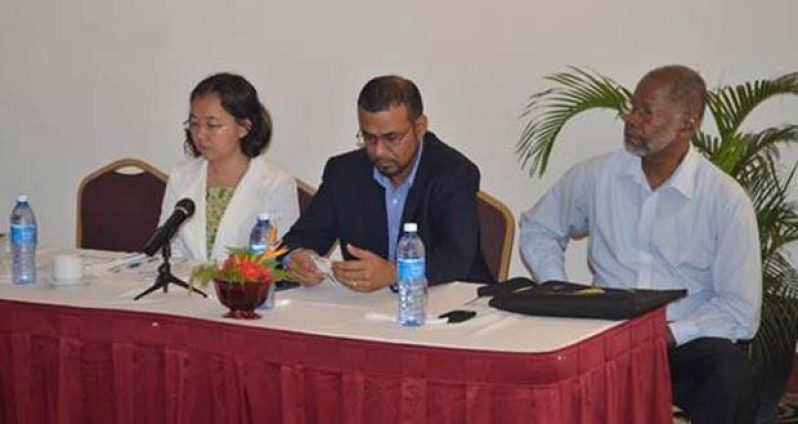AN on-going United Nations Development Project (UNDP) study on the economic and environmental impacts of investments in the mining sector is expected to provide policy recommendations for the improved administration and governance of the sector.
Minister of Natural Resources and the Environment (MNR&E), Mr Robert Persaud, said: “The results of this study will help to elevate our effectiveness in managing and governing the mining sector as a whole, especially looking to the future of our country where we want to ensure that what we do, we do it right not only for today but also for our future generations.”
He made the comment during a policy workshop for the study which is being conducted by two international consultants employed by the UNDP, namely, Masuma Farooki and Sohinee Mazumdar.
Speaking at Herdmanston Lodge on Tuesday last,Deputy Resident Representative of the UNDP Ms.Chisa Mikami disclosed that the study was being done within the framework of the Programme’s global work in the extractive industries, in keeping with its strategy for supporting sustainable and equitable management of the extractive sector for human development.
“The framework,” she said, “was developed in recognition of the fact that oil, gas and minerals are becoming major sources of economic growth for several developing countries. The strategy enables UNDP to respond to a growing belief among the international community, that extractive industries such as mining can contribute to sustainable and equitable development.”
The framework for UNDP assistance, she said, includes enabling participatory legislation, policy and planning processes and conducting people-centred exploration and extraction operations that are gender sensitive and address conflict risks and environmental and social sustainability.
“The UNDP is pleased to be associated with the study and the growing partnership with the MNR&E that seek to support ongoing efforts to harness Guyana’s extractive industries for a people-centred, sustainable development trajectory,” Ms Mikami said.
According to Minister Persaud, the study was timely, in the context of Guyana’s current state of mineral resources development.
“We in Guyana are at a very important stage in terms of turning that corner towards expanded growth and development and in maximising the opportunities that we have.We want to develop a first-class mining industry, learning from the lessons of others, but also ensuring that we have maximum benefits for all the people of Guyana,” Minister Persaud said, adding that the study had been designed to take a critical look at mining policy and mining policy instruments, particularly as they relate to Foreign Direct Investments (FDIs) to ensure that whatever systems were put in place for management of FDIs were in the best interest of the country.
He noted that the preliminary report by the UNDP was welcomed and the MNR&E was looking forward to having the final report, because it will prove to be an important tool in moving forward and improving the management of the extractive sector, particularly the mining sub-sector.
Mr.Bobby Gossai Jnr of the MNR&E disclosed that the international consultants had done the study in two parts one on the economic impact of FDI on the extractive industries and the other the environmental impact of FDIs on the extractive industries, specifically the mining industry.
Ms.Mikami said that the results from the study had shown that Guyana’s mining sector is expected to grow.
She said that projections indicate that large-scale gold production will increase to similar output level as that of small and medium-scale miners and that the sector’s rate of expansion will in all probability gather crucial mass by 2030.
She stressed that in the meantime, Guyana needs to consider improving its mineral sector administration and revising its mining code and policy and the study would prove useful towards this end.
Consultants Farooki and Mazumdar both said that the preliminary report was a reflection of feedback from local stakeholders looked at through the lens of the international environment of the mining sector.
They also stressed that the presentation on the study at the policy workshop was not the final report .
They were looking forward to further feedback from stakeholders before they present their final report with recommendations for improved governance of the mining sector, particularly in relation to FDIs, recommending ways and means to maximise on the benefits of FDIs.
(By Clifford Stanley)



.jpg)









